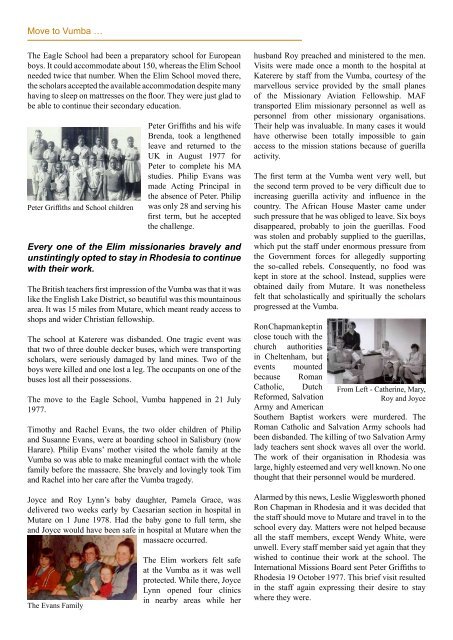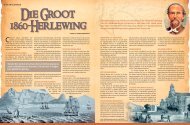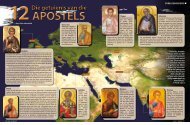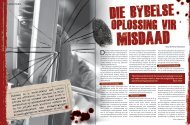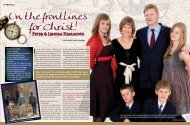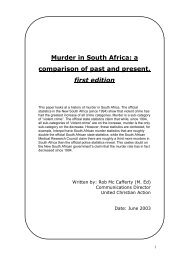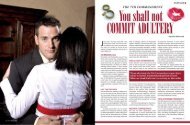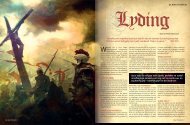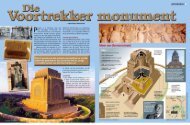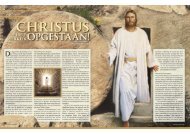The Vumba Tragedy - Elim Missions
The Vumba Tragedy - Elim Missions
The Vumba Tragedy - Elim Missions
Create successful ePaper yourself
Turn your PDF publications into a flip-book with our unique Google optimized e-Paper software.
Move to <strong>Vumba</strong> …<br />
<strong>The</strong> Eagle School had been a preparatory school for European<br />
boys. It could accommodate about 150, whereas the <strong>Elim</strong> School<br />
needed twice that number. When the <strong>Elim</strong> School moved there,<br />
the scholars accepted the available accommodation despite many<br />
having to sleep on mattresses on the floor. <strong>The</strong>y were just glad to<br />
be able to continue their secondary education.<br />
Peter Griffiths and School children<br />
Peter Griffiths and his wife<br />
Brenda, took a lengthened<br />
leave and returned to the<br />
UK in August 1977 for<br />
Peter to complete his MA<br />
studies. Philip Evans was<br />
made Acting Principal in<br />
the absence of Peter. Philip<br />
was only 28 and serving his<br />
first term, but he accepted<br />
the challenge.<br />
Every one of the <strong>Elim</strong> missionaries bravely and<br />
unstintingly opted to stay in Rhodesia to continue<br />
with their work.<br />
<strong>The</strong> British teachers first impression of the <strong>Vumba</strong> was that it was<br />
like the English Lake District, so beautiful was this mountainous<br />
area. It was 15 miles from Mutare, which meant ready access to<br />
shops and wider Christian fellowship.<br />
<strong>The</strong> school at Katerere was disbanded. One tragic event was<br />
that two of three double decker buses, which were transporting<br />
scholars, were seriously damaged by land mines. Two of the<br />
boys were killed and one lost a leg. <strong>The</strong> occupants on one of the<br />
buses lost all their possessions.<br />
<strong>The</strong> move to the Eagle School, <strong>Vumba</strong> happened in 21 July<br />
1977.<br />
Timothy and Rachel Evans, the two older children of Philip<br />
and Susanne Evans, were at boarding school in Salisbury (now<br />
Harare). Philip Evans’ mother visited the whole family at the<br />
<strong>Vumba</strong> so was able to make meaningful contact with the whole<br />
family before the massacre. She bravely and lovingly took Tim<br />
and Rachel into her care after the <strong>Vumba</strong> tragedy.<br />
Joyce and Roy Lynn’s baby daughter, Pamela Grace, was<br />
delivered two weeks early by Caesarian section in hospital in<br />
Mutare on 1 June 1978. Had the baby gone to full term, she<br />
and Joyce would have been safe in hospital at Mutare when the<br />
massacre occurred.<br />
<strong>The</strong> Evans Family<br />
<strong>The</strong> <strong>Elim</strong> workers felt safe<br />
at the <strong>Vumba</strong> as it was well<br />
protected. While there, Joyce<br />
Lynn opened four clinics<br />
in nearby areas while her<br />
husband Roy preached and ministered to the men.<br />
Visits were made once a month to the hospital at<br />
Katerere by staff from the <strong>Vumba</strong>, courtesy of the<br />
marvellous service provided by the small planes<br />
of the Missionary Aviation Fellowship. MAF<br />
transported <strong>Elim</strong> missionary personnel as well as<br />
personnel from other missionary organisations.<br />
<strong>The</strong>ir help was invaluable. In many cases it would<br />
have otherwise been totally impossible to gain<br />
access to the mission stations because of guerilla<br />
activity.<br />
<strong>The</strong> first term at the <strong>Vumba</strong> went very well, but<br />
the second term proved to be very difficult due to<br />
increasing guerilla activity and influence in the<br />
country. <strong>The</strong> African House Master came under<br />
such pressure that he was obliged to leave. Six boys<br />
disappeared, probably to join the guerillas. Food<br />
was stolen and probably supplied to the guerillas,<br />
which put the staff under enormous pressure from<br />
the Government forces for allegedly supporting<br />
the so-called rebels. Consequently, no food was<br />
kept in store at the school. Instead, supplies were<br />
obtained daily from Mutare. It was nonetheless<br />
felt that scholastically and spiritually the scholars<br />
progressed at the <strong>Vumba</strong>.<br />
Ron Chapman kept in<br />
close touch with the<br />
church authorities<br />
in Cheltenham, but<br />
events mounted<br />
because Roman<br />
Catholic, Dutch<br />
Reformed, Salvation<br />
Army and American<br />
From Left - Catherine, Mary,<br />
Roy and Joyce<br />
Southern Baptist workers were murdered. <strong>The</strong><br />
Roman Catholic and Salvation Army schools had<br />
been disbanded. <strong>The</strong> killing of two Salvation Army<br />
lady teachers sent shock waves all over the world.<br />
<strong>The</strong> work of their organisation in Rhodesia was<br />
large, highly esteemed and very well known. No one<br />
thought that their personnel would be murdered.<br />
Alarmed by this news, Leslie Wigglesworth phoned<br />
Ron Chapman in Rhodesia and it was decided that<br />
the staff should move to Mutare and travel in to the<br />
school every day. Matters were not helped because<br />
all the staff members, except Wendy White, were<br />
unwell. Every staff member said yet again that they<br />
wished to continue their work at the school. <strong>The</strong><br />
International <strong>Missions</strong> Board sent Peter Griffiths to<br />
Rhodesia 19 October 1977. This brief visit resulted<br />
in the staff again expressing their desire to stay<br />
where they were.


